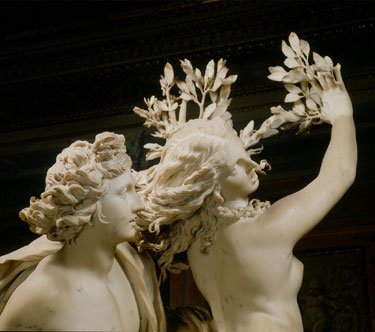Classical Myths Triggering Minorities & Poor at Columbia
Columbia University, Toni Morrison, Trigger Warnings, Western Canon

Detail, Gian Lorenzo Bernini, Apollo and Daphne, 1621-1625, Galleria Borghese, Rome
Four student members of a Multicultural Affairs Advisory Board at Columbia editorialized recently about the hazard of representative elements of the Humanities canon proving triggering for students, particularly for minority students and the poor.
Instead of reading all the naughty bits in Ovid, they proposed that a bit more Toni Morrison might be in order.
During the week spent on Ovid’s “Metamorphoses,†the class was instructed to read the myths of Persephone and Daphne, both of which include vivid depictions of rape and sexual assault. As a survivor of sexual assault, the student described being triggered while reading such detailed accounts of rape throughout the work. However, the student said her professor focused on the beauty of the language and the splendor of the imagery when lecturing on the text. As a result, the student completely disengaged from the class discussion as a means of self-preservation. She did not feel safe in the class. When she approached her professor after class, the student said she was essentially dismissed, and her concerns were ignored.
Ovid’s “Metamorphoses†is a fixture of Lit Hum, but like so many texts in the Western canon, it contains triggering and offensive material that marginalizes student identities in the classroom. These texts, wrought with histories and narratives of exclusion and oppression, can be difficult to read and discuss as a survivor, a person of color, or a student from a low-income background.
The MAAB, an extension of the Office of Multicultural Affairs, is an advocacy group dedicated to ensuring that Columbia’s campus is welcoming and safe for students of all backgrounds. This year, we explored possible interventions in Core classrooms, where transgressions concerning student identities are common. Beyond the texts themselves, class discussions can disregard the impacts that the Western canon has had and continues to have on marginalized groups.
For example, another student who attended the forum shared that her Lit Hum professor gave her class the opportunity to choose their own text to add to their syllabus for the year. When she suggested the class read a Toni Morrison text, another student declared that texts by authors of the African Diaspora are a staple in most high school English classes, and therefore they did not need to reread them. Toni Morrison is a writer of both the African Diaspora and the Western world, and her novels—aside from being some of the most intellectually and emotionally compelling writing in the last century—should be valued as founding texts of the Western canon.
The student’s remark regarding Toni Morrison was not merely insensitive, but also revealing of larger ideological divides. This would have been an opportune moment for the professor to intervene. …
Students need to feel safe in the classroom, and that requires a learning environment that recognizes the multiplicity of their identities. The MAAB has been meeting with administration and faculty in the Center for the Core Curriculum to determine how to create such a space. The Board has recommended three measures: First, we proposed that the center issue a letter to faculty about potential trigger warnings and suggestions for how to support triggered students. Next, we noted that there should be a mechanism for students to communicate their concerns to professors anonymously, as well as a mediation mechanism for students who have identity-based disagreements with professors. Finally, the center should create a training program for all professors, including faculty and graduate instructors, which will enable them to constructively facilitate conversations that embrace all identities, share best practices, and think critically about how the Core Curriculum is framed for their students.
All this is perfectly understandable. If you come from a disadvantaged background, you are bound to know plenty of women who were raped by some Olympian deity in the guise of a bull or a swan, and you undoubtedly have a sister who was forced to change into a laurel tree to avoid the embraces of Apollo. Those kinds of memories are painful!
Hat tip to (T)Reason.




